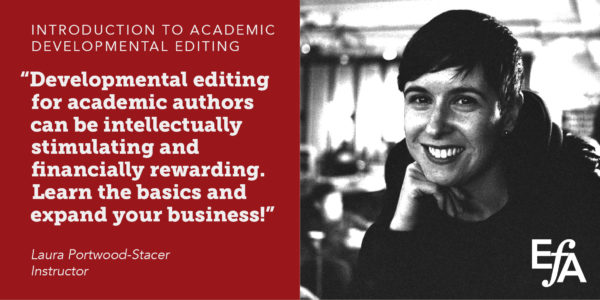Description

This 6-week online course introduces students to the role of developmental editing in academic publishing contexts, the skills needed to perform effective developmental assessments and edits on academic manuscripts, and the services developmental editors offer to academic clients. The course is designed for editors who wish to add academic developmental editing to their portfolio of services or tailor an existing developmental editing practice to academic clients. The course will also be appropriate for academics with some editing experience who are considering branching out into professional freelance editing.
The course will include a combination of instructor lectures (Power Point and/or video recorded), reading assignments, brief writing assignments, and editorial practice assignments (which may be submitted to the instructor for critique if students wish). Weeks three, four, and five will include assignments on which the instructor will provide individual feedback if desired. Live Q&As with the instructor will be held during weeks 3 and 6. (Dates/times of Q&As are: Thursday, Sept 26 at 7:30-9 pm; Wednesday, October 16 from 12:00-1:30 pm and from 7:30-9 pm)
Learning Objectives:
- Understand the academic publishing process and how developmental editing fits into it
- Gain knowledge of the craft of academic developmental editing
- Practice executing the most common tasks in academic developmental editing
COURSE SYLLABUS
Week 1: The Academic Publishing Process & the Scope of Academic Developmental Editing
Objectives:
- Understand the economic landscape of academic publishing for both journal articles and books including who pays for published academic texts.
- Understand the timelines, processes, and personnel of academic publishing from query to submission to peer review to production to publication to promotion.
- Understand the points at which developmental editors may be called on to work on a manuscript and whom they will be contracting with.
- Differentiate developmental editing from other types of editing frequently used in academic publishing (e.g. copy editing, proofreading)
- Identify types of editing that may fall under the purview of a developmental editor (e.g. structural, substantive, line editing)
Materials released Monday, September 9, 2019
Week 2: Articles, Dissertations, and Books
Objectives:
- Become familiar with how different types of publications in the humanities and humanistic social sciences are typically structured
- Understand the needs of clients working on different types of publications
- Consider how audiences and markets differ for different types of academic manuscripts and how these differences shape the work of the developmental editor
- Understand the role of the manuscript assessment in developmental editing
Materials released Monday, September 16, 2019
Week 3: Manuscript Assessment
Objectives:
- Understand the importance of argument, organization, narrative, tone, and style in academic publications and how target audience affects all these aspects of academic writing
- Learn how to diagnose and solve problems of argument, organization, narrative, tone, and style in academic book manuscripts
- Practice assessment on an academic book manuscript
Materials released Monday, September 23, 2019
Live Q&A held 7:30-9pm on Thursday, September 26
Week 4: Academic Book Proposals
Objectives:
- Learn the standard components of an academic book proposal and what purpose each component serves in the academic publishing process
- Identify common mistakes in academic book proposals
- Practice critiquing an academic book proposal
Materials released Monday, September 30, 2019
Week 5: Hands-on Editing & Crafting the Editorial Letter
Objectives:
- Learn how to approach a hands-on developmental editing project in MS Word, including use of Track Changes, Comments, and in-text insertions
- Review a document that has been edited by a developmental editor and understand all the changes, comments, and insertions made
- Practice editing a short document using MS Word
- Understand the purposes of an editorial letter and how those purposes shape what information is included and how it is presented
- Practice drafting an editorial letter for a client
Materials released Monday, October 7, 2019
Week 6: The Business of Academic Developmental Editing
Objectives:
- Learn the basics of setting up a freelance editorial business
- Consider matters of pricing, rates, and billing
- Discuss strategies for marketing, networking, and attracting desirable academic clients
Materials released Monday, October 14, 2019
Live Q&A held 12:00-1:30pm and 7:30-9pm Wednesday, October 16, 2019
Instructor bio:
Laura Portwood-Stacer, PhD, runs Manuscript Works (manuscriptworks.com), which offers freelance developmental editing services and publication consulting to academic authors. She holds a PhD in Communication from the University of Southern California and is the author of Lifestyle Politics and Radical Activism (Bloomsbury Academic, 2013), a book based on her doctoral dissertation. She has extensive experience as a journal editor and peer reviewer, including a former post as co-editor of book reviews and commentary at the journal Feminist Media Studies. Before becoming a developmental editor, Laura taught courses in media studies at New York University and the University of Southern California.
Our online courses are conducted through Sakai, a learning management system (LMS). You never need to be at your computer at any specific hour. More information about how these asynchronous classes are conducted is available here. Information on our refund policy is available here. All participants in EFA courses must abide by our anti-harassment policy, which you can find here.


